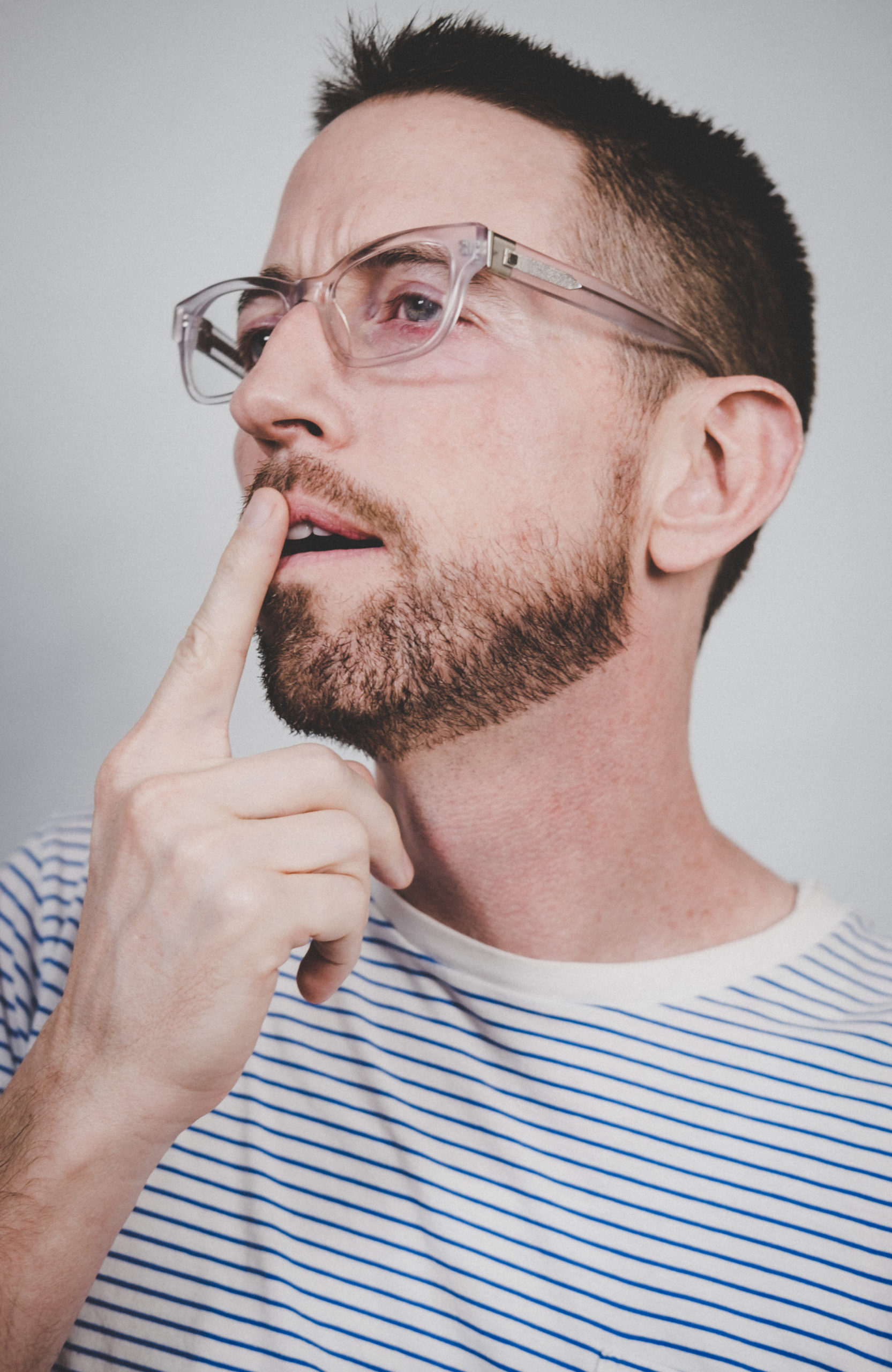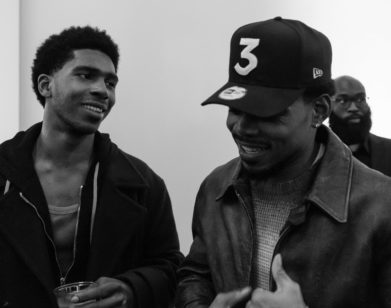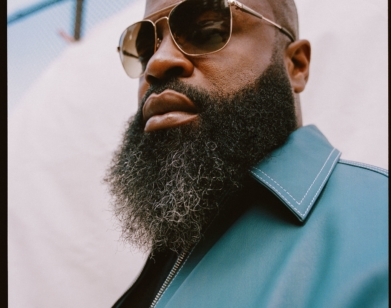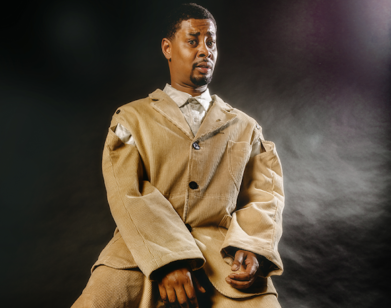funny ha ha
Neal Brennan and Derek DelGaudio on Grey Areas and Talent Traps

Tomorrow evening on September 9, the comedian and writer Neal Brennan will take the stage for the opening night of Unacceptable, his new performance series at New York City’s Cherry Lane Theatre. Brennan—who famously co-created the smash hit Chappelle’s Show alongside the show’s namesake—has spent recent years building a name for himself as an idiosyncratic solo presence in the comedy circuit. In his 2017 Netflix comedy special 3 Mics, Brennan used three microphones— one for one-liners, one for traditional stand-up and one for emotional childhood anecdotes—to deconstruct his set into its component parts before the audience’s eyes.
Unacceptable, which runs through the end of November (tickets go on sale the 9th), is directed by the magician and writer Derek DelGaudio, whose critically-acclaimed Hulu special, 2020’s In & Of Itself, put the slight of hand artist on the map. Together, Brennan and DelGaudio have crafted a genre-bending show focused as much on fun and laughter as it is on intimacy and honesty. Below, we caught up with Brennan and DelGaudio to learn more about the making of Unacceptable. —JAKE UITTI
———
NEAL BRENNAN: It really doesn’t matter who gets more attention in this article, right? I can ask Derek questions and he can ask me questions?
JAKE UITTI: Absolutely.
DEREK DELGAUDIO: This is just going to be a competition to see who can evade more questions.
UITTI: You can just do impersonations the whole time, if you want.
BRENNAN: Oh, you don’t want to hear that. That could get ugly quickly.
UITTI: So, when was the last time you guys cried?
BRENNAN: I cried a little bit on Wednesday during the show. It wasn’t a full spritz. It was like a teary-eyed weepy. That’s more the level I’m at—especially on stage. You can’t just stop, you can’t let it hijack the show. And once you start crying, you’re slowing everything down. How about you, Derek? When was the last time you cried?
DELGAUDIO: I’ve been holding back a lot of tears lately. The last time I cried had to have been at a movie. I just don’t recall which one.
BRENNAN: What movie triggered a surprisingly emotional reaction in you?
DELGAUDIO: Literally Swamp Thing. I was six years old. Do you remember the movie Swamp Thing? It was based on a comic book where a scientist has a terrible accident and he turns into a thing made of swamp.
BRENNAN: I figured, yeah.
DELGAUDIO: I cried a lot at the end after the hero saves the lady. My mom asked me, “Why are you crying?” I turned to her and said, “She loved him even though he was a plant.”
BRENNAN: You were being sincere?
DELGAUDIO: One hundred per cent. She still holds that over me.
BRENNAN: I can’t believe how much I cried at the Amy Winehouse documentary. You’re supposed to, not not as much as I did, I don’t think.
DELGAUDIO: Did you know her?
BRENNAN: I had no relationship to her. I know Mark Ronson, who produced her record [Back to Black]. And recently, I listened to the beginning of the song “Valerie,” and she quotes a sketch from Chappelle’s Show.
DELGAUDIO: Oh, wow!
BRENNAN: I was like, “What the fuck!” You can hear it in the recording.
DELGAUDIO: What do you think it is about her story that resonated with you?
BRENNAN: I don’t even relate to her that much. But watching her, you get the sense that she’s, like, an athlete who’s too powerful for her body. Like Bo Jackson, whose muscles were too strong for his bones. Amy Winehouse had 15 feet of talent packed into five feet. Watching her be decimated by drugs and family and relationship stuff was heartbreaking.
DELGAUDIO: So, you think there’s such a thing as too much talent?
BRENNAN: Mostly not. But it must have been confusing for her, a little bit, to be like, “Why am I able to do this?”
DELGAUDIO: Do you think people get trapped by their talent?
BRENNAN: No, but I think people use their talent as an excuse to not be decent people. That’s the trap. I don’t want to cast aspersions. Not here! Thankfully, I have to work so hard at being funny that I could never imagine being so funny I don’t have to be nice to people. I’m not nice to people all the time, but that’s just my own petulance.
DELGAUDIO: Have you ever had the thought—I have—that you might not be cruel enough to be successful?
BRENNAN: Oh, definitely. For example, right now, we’re sitting on a stoop in the West Village that we’re not allowed to sit on. I saw a sign that this stoop is for residents only.
DELGAUDIO: That’s about as rebellious as both of us get.
BRENNAN: That’s some bad boy shit. Neither one of us are especially rebellious, both of us are rule followers, except when it comes to—
DELGAUDIO: —Work.
BRENNAN: Right. The form of the thing we do. Because you do, uh, what sadly can only be called magic. And I say “sadly” because it doesn’t even begin to approach what it is. And I do comedy when really what I do should be called “magic.”
DELGAUDIO: You’re right, we both operate in grey areas. It’s a unique position to be in, because we can operate outside of normal systems, but it also isolates us from any sort of peer group in this industry, when we really just want to belong.
BRENNAN: More than anything. Nothing would give me greater pleasure than to be on “The Bad Boys of Comedy Tour.” Just me and five friends doing arenas, traveling the country. But there are downsides to that as well. We may just be grass-is-always-greener people. What we’re saying ism we’re isolated and lonely, but in some ways we isolated ourselves.
DELGAUDIO: Yeah.
BRENNAN: But at the same time, feel sorry for us!
DELGAUDIO: Yeah, it’s self-imposed. But why do you think you can’t just do a “normal” standup comedy show and I can’t just be… whatever it is I am?
BRENNAN: I have. It’s just not as good or fulfilling for the audience or me.
DELGAUDIO: It feels unnatural.
BRENNAN: It feels just like a little craven, or something. What was the most “magic-y” moment of your magic career? Like, the most bunny in the hat, velvet jacket thing?
DELGAUDIO: I avoided all the sparkles and velvet and top hats. I had great mentors and most of the performers I looked up to weren’t magicians. And I had a very narrow idea of what a magician was and in many ways. Orson Welles was once asked by an interviewer, “You’re a writer, director, producer, star of stage, screen and radio. When you’re gone, how would you like to be remembered?” Orson replied, “As a magician.” It took years for me to understand: That’s the kind of magician I wanted to be.
BREANNAN: It’s so funny that so many people think of magic as being confined to cards and hats.
DELGAUDIO: 3 Mics was a very magical show for me. There are no secrets involved, but it has a magical impact. That’s the type of magic that I’m into—performances that reveal how something we know well could actually be something different. Seeing the unseeable, in a way.
BRENNAN: What were your most memorable early magic shows?
DELGAUDIO: I did Bar Mitzvahs. I performed in the back of a pizza parlor. I performed at a retirement home, which was probably the most devastating, because the audience is literally wheeled in there against their will and forced to watch a young man do magic. You need them to remember something for a trick to work, and they’re falling asleep mid-way through. It’s the worst possible setting. There were also the celebrity parties where you may as well be serving cocktails. Did you ever experience people being surprised that you were the other half of Chapelle’s Show? Or was it kind of a known thing?
BRENNAN: I think it was kind of known. But, you know, nobody thinks I did anything. It’s like when you play on Michael Jordan’s team, nobody really cares. People would say, “Oh, Neal helped create Chappelle’s Show.” No, I didn’t “help.” I made it. But people don’t understand that.
DELGAUDIO: Why do you think that’s hard?
BRENNAN: Because people don’t know how TV shows are made, so they don’t understand you just have to get your hands dirty.
DELGAUDIO: And it works both ways. I’m sure some people tried to discredit Dave.
BRENNAN: Well, yeah, though much less. Sometimes people will discount him by saying that, because he’s a comedian, he can’t do structure or style, which is stupid and insulting. And maybe a little racist. Yeah, I said it!
DELGAUDIO: Was it hard transitioning from writing to stand-up?
BRENNAN: It was more a matter of explaining to people why I was doing it. The truth is, being a writer on a TV show is not that much fun. Nothing is more fun than being a performing comedian. We did a show last night, and because of the flooding in New York, a bunch of alerts were going off all night. Loud beeps were going off throughout the show.
DELGAUDIO: That would have been impossible to deal with if you were any other type of performer.
BRENNAN: Yeah, if I was a singer, it would have been over. But thankfully, I could incorporate it into the show in a way that is memorable. There’s definitely a downside of that public presence, though. Because I’m not married and don’t have kids, people are like, “Oh, so you’re a sex addict?” To which I say, “No.” I don’t drink and I don’t really smoke weed, so people are like, “Oh, so you’re a straight-edge teetotaler sober person?” It feels unfair.
DELGAUDIO: It call your values into question.
BRENNAN: Instead of just being a personal choice. When women make the choice to skip marriage and children, people pity them, but at least there is a bit of a feminist heroine angle. For a guy, it’s like, “No, you’re fucking broken!” I’ve just come to the conclusion that, instead of raising kids, I need to raise myself.
DELGAUDIO: Nobody would ever describe a bachelor as being thoughtful and careful about how and with whom he commits.
BRENNAN: We all could do get married. All it takes to get married is one person who’s afraid to say no. But the show is about more than marriage. Mostly, it’s me talking to myself.
DELGAUDIO: And trying to understand yourself. From both personal experience and observation, the pain that goes with feeling unseen is universal. I grew up in a very diverse household. When I found myself in the real world, I genuinely didn’t understand cruelty based on race, gender, appearance, any of that. Watching people treat my mother differently based on their a pre-conceived notions of her identity really stuck with me. Dismantling that became a priority. I think you and I are more interested in creating safe spaces for others than ourselves, even.
BRENNAN: I’m more about myself, honestly. I think if I do that, then other people will see the example.
DELGAUDIO: I think you’re a really good example of how to be so selfish that you’re actually generous.
BRENNAN: That’s what I tell myself!



